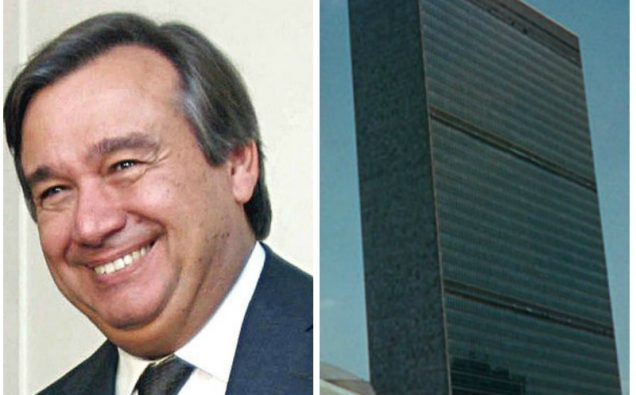
The Security Council held its first “straw poll” for the next secretary-general of the United Nations on Thursday, with António Guterres, a former Portuguese prime minister who served as U.N. High Commissioner for Refugees for 10 years, emerging as the front-runner in the campaign to succeed Ban Ki-moon at the world’s top diplomatic post, according to diplomatic sources.
The outcome of the contest for the world’s top U.N. job dealt a blow to the candidacies of other prominent hopefuls, including Argentine Foreign Minister Susana Malcorra, who finished in eighth place in the straw poll, and former New Zealand Prime Minister Helen Clark, who finished in sixth.
The straw poll gave a boost to the campaigns of sleeper candidates like Danilo Turk, a former Slovenian president and U.N. veteran, who finished closely behind Guterres, as well as Irina Bokova, a Bulgarian national and director-general of UNESCO, who finished third. But it also dampened hopes among many delegates that a woman might lead the United Nations for the first time in its history. There was only one woman among the top five contenders.
Speaking to reporters at the UN Headquarters, Ambassador Koro Bessho of Japan, which holds the Council’s presidency for July, confirmed that the first round of the so-called ‘straw polls’ had taken place, and each candidate would be informed of the results through his or her country’s permanent representative to the UN. He also noted that he had informed that the President of the UN General Assembly, Mogens Lykketoft, that the vote had taken place, but did not reveal the results.
He said that the straw poll is “an indicative vote – to inform the candidates where they stand in the race, and to inform the Council members how the race might go from here.”
After the polling was concluded, Portugal’s Foreign Minister Augusto Santo Silva welcomed the outcome, telling reporters it provides “clear incentive to Mr. Guterres’ candidature and confirms that he is particularly qualified for the position of Secretary General.”
The secrecy surrounding the vote — the 15-member Council did not release the results of the straw poll — became cause of concern to U.N. envoys who had been pressing for greater openness in the process of selecting the secretary-general. Lykketoft — who was hosted a series of unprecedented public meetings in the General Assembly with the candidates — criticized the Security Council’s discretion.
“In my view, limiting the communication to the fact that the informal straw poll has taken place without any further detail adds little value and does not live up to the expectations of the membership and the new standard of openness and transparency,” he said.
Thursday’s vote was designed to narrow the slate of 12 candidates vying for the top U.N. job, and provide council members with some clarity on which aspirants stood a chance of securing sufficient support to continue. Guterres came out on top with 12 delegates encouraging him to pursue the top job, three expressing no opinion, and none discouraging him to go for it. Turk was close behind with 11 votes of encouragement. But two delegations discouraged him and two expressed no opinion. If any of those “discourage” votes were cast by permanent members that could spell danger for his campaign.
Bokova, who was seen as flagging in the race, recovered ground by securing nine votes in favour, continuing her bid. But she received four votes of discouragement, raising the risk that she may be opposed by a permanent member of the council. Vuk Jeremic, a former Serbian foreign minister, and Serjm Kerim, a former U.N. General Assembly President, also performed better than expected, each gaining nine votes in favour of their candidacies. But they each received five votes of discouragement.
The initial sounding by the Security Council proved particularly discouraging to two of the U.N.’s best-known candidates, Helen Clark, who currently serves as the executive director of the U.N. Development Programme, and Susana Malcorra, who served for nearly a decade as a top U.N. official, including more than four years as Ban’s chief of staff. Clark obtained only eight votes of encouragement, and five delegations discouraged her from running. Malcorra, who is widely viewed as the United States’ favourite, received only seven votes in favor of her candidacy.
But Malcorra took to Twitter late Thursday vowing to pursue her bid for the top U.N. job, thanking council members that supported her candidacy. “This support has made me even more committed to continue working with my team and with all states members in pursuit of this candidacy,” she Tweeted. Clark also pledged to press ahead, writing on Twitter that she was “thankful for the support shown in first straw poll of NextSG candidates. Look forward to continuing #Helen4SG conversations.”
The contest dealt the harshest blows to the candidates with the least U.N. experience, including Croatia’s former Foreign Minister Vesna Pusic, former Montenegrin Prime Minister Igor Luksic and former Moldovan foreign minister Natalia Gherman, who finished at the bottom. Christiana Figueres, a veteran Costa Rican diplomat who headed U.N. climate negotiations, also finished near the bottom of the pack, with five states encouraging her candidacy, five discouraging it, and five expressing no opinion.
Diplomats attributed Guterres’s strong showing to his extensive U.N. experience and an effective performance in a series of U.N. debates. A natural communicator with a deep grasp of U.N. affairs, Guterres has emerged as a clear favourite among the U.N.’s rank-and-file.
But his path to the top U.N. job is anything but assured. While Russia did not vote to discourage Guterres’s candidacy, Moscow has made clear that it would prefer the job went to an Eastern European candidate. Traditionally, U.N. secretaries-general have been elected on the basis of rotation among the U.N.’s main regional groups. Russia, as well as many other countries, believe that it is Eastern Europe’s turn.














